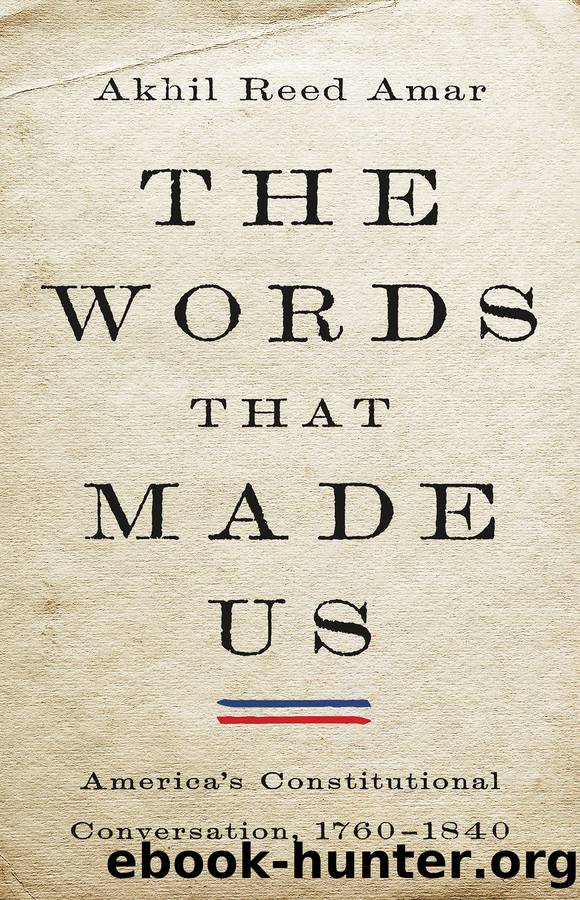The Words That Made Us by Akhil Reed Amar

Author:Akhil Reed Amar [REED AMAR, AKHIL]
Language: eng
Format: epub
Publisher: Basic Books
Published: 2021-05-04T00:00:00+00:00
WASHINGTON BADE FAREWELL IN 1796, and in the ensuing election, Americans pushed the two most notable remaining icons of 1776, John Adams and Thomas Jefferson, in that order, into the presidency and vice presidency. Neither man in 1796 chose the other as his political teammate. On the contrary.
Federalists encouraged Adams to team up with South Carolinian Thomas Pinckney, who had won the Westâor at least, western navigation of the Mississippiâin the popular 1795â1796 Pinckney Treaty. Republican darling Jefferson, in turn, partnered with New Yorker Aaron Burr. Neither of the two fledgling parties got its wish. America in effect split the difference, giving Adams the most electoral votes and Jefferson the second most. As a result, Adamsâs main and closely matched rival ended up as his vice president, creating a far more fraught dynamic than when he himself had played distant and loyal second fiddle to Washington.
In an effort to rekindle the spirit of 1776, Adams tried to extend an olive branch to Jefferson, praising him to those who would likely forward the compliments to their intended recipient.14 At first, Jefferson was tempted to reciprocate. In late 1796, he drafted a buttery letter to Adams that ended with the wish âthat your administration may be filled with glory and happiness to yourself and advantage to us [America].â Acknowledging that âthoâ, in the course of our voyage throâ life, various little incidents have happened or been contrived to separate us,â Jefferson proclaimed that he (referring to himself in the third person) âretains still for you the solid esteem of the moments when we [back to first person] were working for our independance, and sentiments of respect and affectionate attachment.â This smooth playing of the 1776 card reflected Jefferson at his most gracious and clever. Nostalgic references to the high point of Adamsâs own life were always the most direct way to Adamsâs heart. Jeffersonâs letter also contained a snide aside about Hamilton, whom Jefferson loathed and whom, he believed, Adams likewise distrusted: âIt is possible that you may be cheated of your succession by a trick worthy the subtlety of your archfriend of New York [a sarcastic reference to Hamilton], who has been able to make of your real friends tools to defeat their and your just wishes.â15 Translation: We have a mutual enemy. Letâs reunite?
Specifically, Jefferson was tipping off Adams that Hamilton had been secretly angling to elect Pinckney over Adams, just as Hamilton in 1789 had encouraged strategic balloting at Adamsâs expense. Whether or not Hamilton was in fact trying to deceive pro-Adams Federalist electors in the processâfrustrating their true and âjust wishes,â as Jefferson claimedâJefferson wanted Adams to believe that this was so, and to trust Jefferson as a loyal informer.
Jefferson sent the letter to Madison, his informal campaign manager, to be forwarded to Adams at Madisonâs discretion. In a fateful decision that may have sharply bent the course of history, Madison opted to pocket the letter, offering Jefferson several reasons. He was unsure how the prickly Adams might respond to several particular passages, including the warning about Hamiltonian machination.
Download
This site does not store any files on its server. We only index and link to content provided by other sites. Please contact the content providers to delete copyright contents if any and email us, we'll remove relevant links or contents immediately.
| Africa | Americas |
| Arctic & Antarctica | Asia |
| Australia & Oceania | Europe |
| Middle East | Russia |
| United States | World |
| Ancient Civilizations | Military |
| Historical Study & Educational Resources |
The Dawn of Everything by David Graeber & David Wengrow(1690)
The Bomber Mafia by Malcolm Gladwell(1618)
Facing the Mountain by Daniel James Brown(1544)
Submerged Prehistory by Benjamin Jonathan; & Clive Bonsall & Catriona Pickard & Anders Fischer(1451)
Wandering in Strange Lands by Morgan Jerkins(1416)
Tip Top by Bill James(1408)
Driving While Brown: Sheriff Joe Arpaio Versus the Latino Resistance by Terry Greene Sterling & Jude Joffe-Block(1363)
Red Roulette : An Insider's Story of Wealth, Power, Corruption, and Vengeance in Today's China (9781982156176) by Shum Desmond(1349)
Evil Geniuses: The Unmaking of America: A Recent History by Kurt Andersen(1339)
The Way of Fire and Ice: The Living Tradition of Norse Paganism by Ryan Smith(1323)
American Kompromat by Craig Unger(1306)
It Was All a Lie by Stuart Stevens;(1294)
F*cking History by The Captain(1289)
American Dreams by Unknown(1277)
Treasure Islands: Tax Havens and the Men who Stole the World by Nicholas Shaxson(1252)
Evil Geniuses by Kurt Andersen(1248)
White House Inc. by Dan Alexander(1206)
The First Conspiracy by Brad Meltzer & Josh Mensch(1167)
The Fifteen Biggest Lies about the Economy: And Everything Else the Right Doesn't Want You to Know about Taxes, Jobs, and Corporate America by Joshua Holland(1115)
